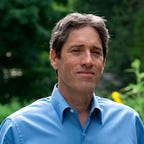Mapping health care at the MTLC Unconference
The MTLC Unconference is an annual meeting of local software executives and entrepreneurs, and this year it was just as fun as ever. Richard Dale hosted a session on “Mapping Health Care Big Data.” After hearing many stories about what people could not do with data, or data they could not get, I got up and drew a picture of the way it SHOULD work. In this vision of the future, you keep your data, use it to get good advice that makes you healthier, and parcel it out to use for aggregate studies that benefit everyone.
The picture is here along with the rest of Richard’s maps and notes.
A number of people came up to me after the session and expressed interest in this vision. They were disappointed to find out that I actually don’t know anything about health care. But I believe we can make it happen. If we can’t do it in the US, we will find some other country where we can prove it out.
The map starts with an individual person, and a personal store of data about that person — the box labeled “my records and advice.” In the future, you will have devices like smartphones and smartwatches and tricorders that keep track of lots of things about you and your health. The “quantified self” trackers will become more convenient and mainstream. The output from these devices is the BIG part of big data, data of indefinitely large size. In the present, if you get medical treatment, you generate lots of data from imaging and other tests. I find it REALLY ANNOYING how hard it is to get and keep this data, and I think that the way around this problem is to deliver it to a patient smartphone as soon as the results go to a doctor.
The underlying principle behind this diagram is that individuals should be able to grab and keep their own data as it is generated. I see three reasons for this:
1) They need it to guide their own health and wellness decisions. That’s the “Advice” part. They can get advice from the machine, or send it out to human and automated advisers.
2) It’s the only way to bypass a corrupt system. Collecting personal health data is not a new idea. However, past attempts to accumulate personal data have failed, like Google Health, or remained in obscurity, like Microsoft Health Vault. I believe that they failed because they have attempted to get data out of existing health care providers — who don’t want to provide it or aren’t allowed to provide it. My proposal is to grab the data at the source by finding a way to suck it into mobile phones before it gets locked into corporate vaults.
3) People will be able to provide good data, and BIG data, for aggregate studies. The aggregate data that is used for studies is bad. A lot of agggregate data that is currently used for studies is from insurance claims data that is submitted to get paid, not to accurately describe patients.
People can provide this data to aggregate databases which keep lists of humans and their health incidents and attributes. In the diagram, I suggest that when it gets sent it, it should be “digested”, which is really summarizing and anonymizing.
We need this data so that we can run statistical studies that show us what correlates with good health and helps us provide advice. The data that is used now for these studies comes from millions of people and is called “big data”, but actually it’s small compared to the real BIG data streams. As the data gets bigger, we will deliver it to specialized learning services and projects which apply machine learning to understand volumes and types of data that would confuse humans.
I think that once patients take over and have good data, we won’t need as many doctors, which will relieve the doctor shortage and reduce costs. In many cases, patients who get systematic and statistically based treatments do better than patients who respond to whatever their artistically-inclined doctor pays attention to. It seems that an attentive computer will actually make better recommendations than an intermittently attentive doctor will make. The computer will be informed by experience from people, out of the billions on earth, who are surprisingly like you.
